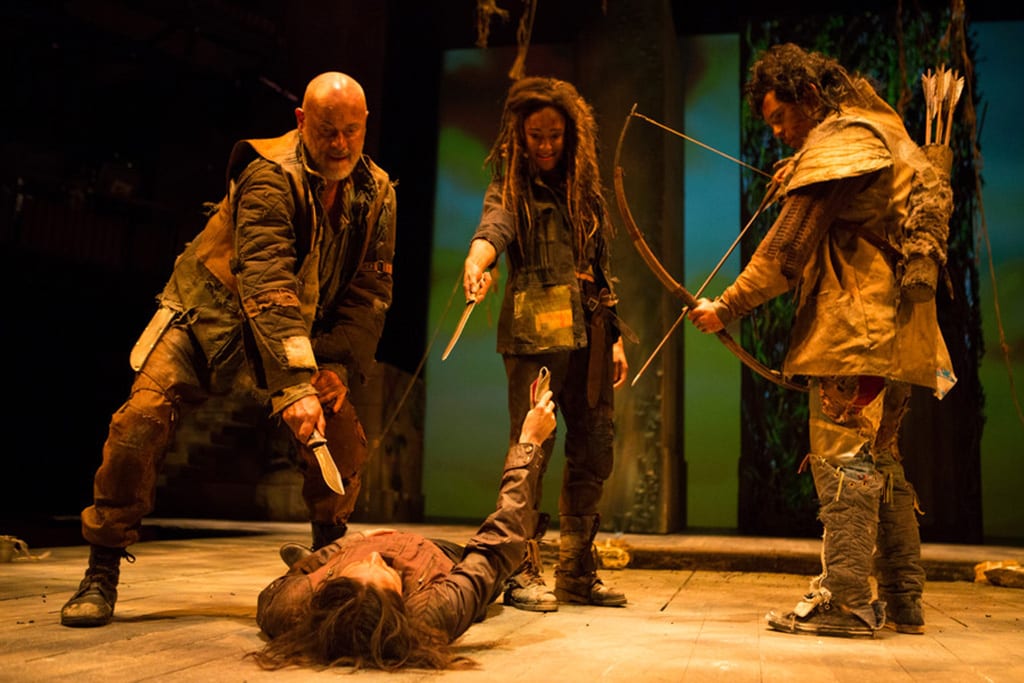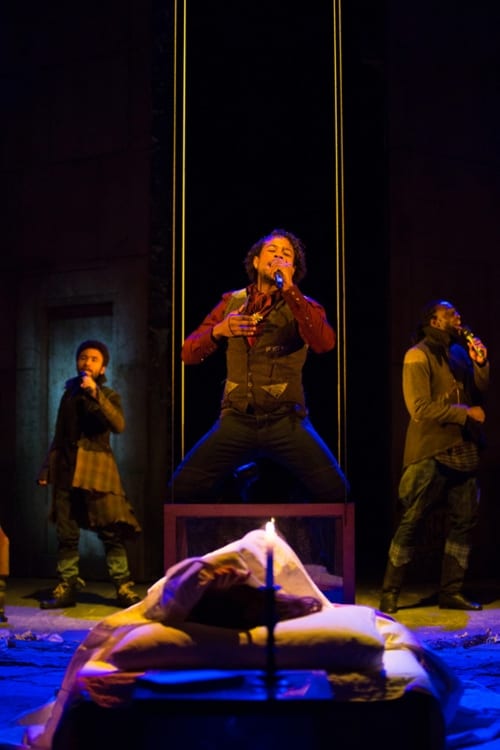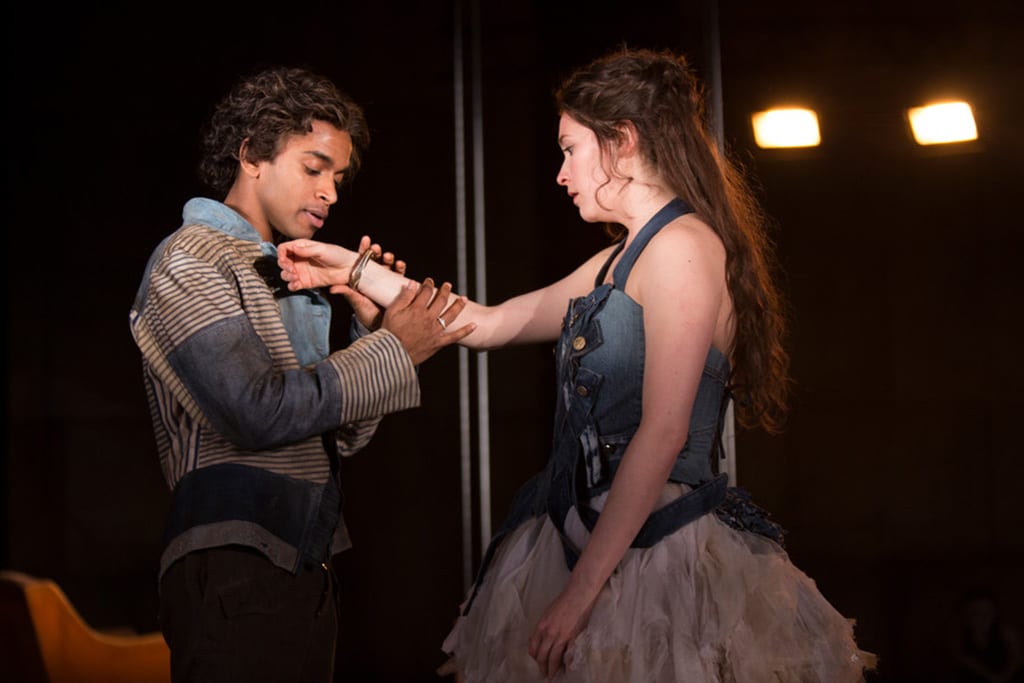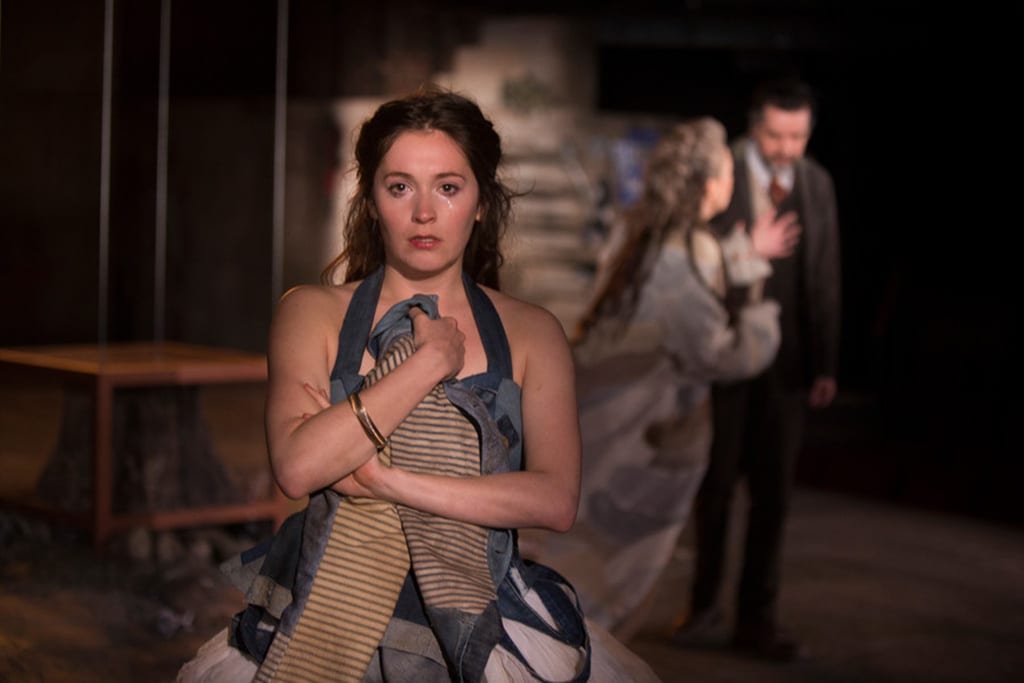Melly Still’s adaptation of Shakespeare’s Cymbeline for the RSC, now shown at the Barbican, is an inventive reverie-cum-horror which revels in dark humour and kitsch. Indeed embracing the tastelessness of the play with its characteristic Jacobean decadence and excess really paid off.
Cymbeline is not an easy play to stage. Less popular today than other Shakespeare’s works it is a romance play written towards the end of his career and is not necessarily his best work. It is a plot-speaking compendium of all of the Bard’s characteristic tropes such as women cross-dressing (to avoid peril and win love), male jealousy (almost leading to a tragedy), much ado about female chastity and honour, a scheming royal family divided by the personal quest for power, endless family reunions and mistaken identities as well as such favourite plot devices as a stolen token of love and a potion which lets you fake death. This largely self-plagiarised, most generically mixed play suits popular postmodern approaches to staging it. And Still really committed to adapting the play as a patchwork of popular and avant-garde cultural influences with an additional focus on European languages and cultures. Grand Guignol, the tradition of French horror shows of the first half of the twentieth century is probably the most pronounced influence as dark humour, death and torture are intertwined with entertaining results.
It would take far too long to relate the full story of Cymbeline it will suffice to say that in the play, the king of Britain (and in this production Queen), under the influence of his consort is forcing to marry his daughter, Imogen to his stepson, Cloten. But Imogen is already married to Posthumus which leads to his exile, her eventual escape and many other events which are reconciled in a happy ending. The story begins in Roman Britain but soon travels to the cosmopolitan and multicultural court of Rome (where we meet deceitful Iachimo) and then the dangerous and wild mountains of Wales where Cymbeline’s kidnapped children live under care of Belarius.
The stage design by Anna Fleischle is deceptively simple: the production starts with it being almost bare, uncluttered. There is a stump of a tree encased in glass in the centre of the stage and a big armchair stage left while two massive projection screens dominate the back wall. In fact she has many surprises in store for the audience which I will not divulge.
The first half of the production is better thanks to competent comic performances from Oliver Johnstone’s charismatic Iachimo and oddball Marcus Griffiths’ Clotus. Both actors also project and deliver their lines in an engaging and clear way which sadly cannot be said about a number of actors in this production. Since it is a postmodern adaptation I would have committed to this even more by letting actors use microphones (a microphone appears in the comedic singing performance by Cloten and his followers). In fact the music composed by Dave Price and the use of songs and dance is so effective in Still’s production (certainly a ‘Eurotrash-y’ dance number in Rome including a moustachioed guy channelling a Lady Gaga is one such example) that ‘Cymbeline: the musical’ would have been not a bad idea.
But once the two villains are out of the picture the second half of the production has to depend on the wild antics of the unconvincing lover Posthumus and a lot of plot speaking, especially towards the end, which kills the otherwise good pace of the show. In fact the text was not cut enough to make it a more fast-moving production. The production is also a bit too messy and overcrowded with ideas in places: brilliant surreal scenes are accompanied by tedious overlong speeches determined to acquaint us with every little fact (the use of maps in several scenes comes across as a lesson in primary school geography).
But there is much to be liked in Still’s work. She introduced interesting gender dynamics and unusual characterisation of Imogen. Bethan Cullinane does not play a stereotypical romantic heroine instead giving us a slightly geeky, less-than-graceful Imogen. She is frank, fresh, unassuming and charming in her ardent passion for her beloved Posthumus – no wonder that Iachimo used to the decadent ways of his own court falls for her.
And there is Europe: full of hilarious stereotypes, complete with greasy haired smooth-talking Italians in white suits, wearing moccasins without socks, speaking Latin. Yet the politics of the production so blatantly communicated in the programme are not that obvious – this is not a Brexit or post-Brexit play. The discourse of British self-determination (liberty from Rome/ EU) would have been a bit of a joke as it is led by Cloten and his father – the two clear villains of the play who are only after personal gain (erring Iachimo repents in the end). Far more interesting are the already mentioned gender politics of the production which come out most acutely in the story of Pissania, especially in the violent scene with Cloten. Not sure if to ravage her or beat her up Cloten first mounts her, than he appears to kiss her but finally bites her lips causing her bleed profusely around the mouth. Pissania suffers not only because she decides to be loyal to Imogen but also because she wants to look and live like a man. However by belonging to a male and female world she is the only one who truly understands where the truth and justice is and is instrumental in averting the tragedy.
I highly commend the director for the ethnic diversity introduced to the play as well – actors of various ethnicities get to play major parts in the play – this is RSC at its best: open and creative. Overall Still’s adaptation is a valiant attempt at adapting a slightly unpalatable Shakespearean play, more than that: her Cymbeline is an imaginative, playful and thoughtful production, breathing some new ideas into postmodern Shakespearean adaptation and quite bravely at that.




